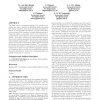803 search results - page 95 / 161 » Game Theory and Decision Theory in Multi-Agent Systems |
LICS
1991
IEEE
14 years 25 days ago
1991
IEEE
Baeten, Bergstra, and Klop (and later Caucal) have proved the remarkable result that bisimulation equivalence is decidable for irredundant context-free grammars. In this paper we ...
HICSS
2005
IEEE
14 years 2 months ago
2005
IEEE
This study extends the theory of Recognition Primed Decision-Making by applying it to groups. Furthermore, we explore the application of Template Theory to collaboration. An exper...
ATAL
2011
Springer
12 years 9 months ago
2011
Springer
The main goal of a persuasion dialogue is to persuade, but agents may have a number of additional goals concerning the dialogue duration, how much and what information is shared o...
ECAI
2004
Springer
14 years 2 months ago
2004
Springer
Abstract. The emergence of complex network structures of relationships between autonomous agents occurs in a wide range of distributed systems. Many researchers have proposed model...
JAIR
2008
13 years 9 months ago
2008
It is well-known that acting in an individually rational manner, according to the principles of classical game theory, may lead to sub-optimal solutions in a class of problems nam...

